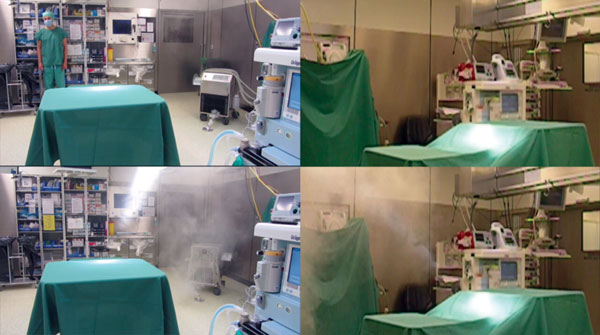Transmission of Mycobacterium chimaera from Heater–Cooler Units during Cardiac Surgery despite an Ultraclean Air Ventilation System
Abstract
Heater–cooler units (HCUs) were recently identified as a source of Mycobacterium chimaera causing surgical site infections. We investigated transmission of this bacterium from HCUs to the surgical field by using a thermic anemometer and particle counter, videotape of an operating room equipped with an ultraclean laminar airflow ventilation system, and bacterial culture sedimentation plates in a nonventilated room. Smoke from the HCU reached the surgical field in 23 s by merging with ultraclean air. The HCU produced on average 5.2, 139, and 14.8 particles/min in the surgical field at positions Off, On/oriented toward, and On/oriented away, respectively. Culture plates were positive for M. chimaera <5 m from the HCU in the test room. These experiments confirm airborne transmission of M. chimaera aerosols from a contaminated HCU to an open surgical field despite ultraclean air ventilation. Efforts to mitigate infectious risks during surgery should consider contamination from water sources and airflow-generating devices.Volume 22, Number 6—June 2016 Authors: Rami Sommerstein, Christian Rüegg, Philipp Kohler, Guido V. Bloemberg, Stefan P. Kuster, and Hugo Sax
 |
| Video image captures showing effect of heater–cooler unit orientation on smoke dispersal in a cardiac surgery room and transmission of Mycobacterium chimaera during cardiac surgery despite an ultraclean air ventilation system. The device was switched on and began to ventilate 10 s after the start of the video. Frames on the left show an overview including unit placement. Frames on the right provide a lateral view of the operating field under the laminar airflow. Simultaneously recorded videos in the upper 2 frames show the first scenario, in which the main ventilation exhaust was directed away from the operating field. Simultaneously recorded videos in the lower 2 frames show the second scenario, in which the main ventilation exhaust was directed toward the operating field. |
Quite a few research papers were published in 2016 addressing the incidence of a surgery-acquired infection that might and might not affect the health of patients who have undergone open-heart surgery around the world. And that's a lot of people. Those who do acquire the infection -- non-tuberculosis mycobacterium (NTM) -- may not have any symptoms for months, or even years post-surgery. The infection that has invaded their body might have only slight symptoms and never advance to anything serious. On the other hand, for some, it can become a life-threatening situation.
It seems that the threat of this infection occurring has been noted for some time - vastly pre-dating 2016, papers were published in 2013 positing the same theory later proven. In any event, it has been known for quite awhile that the heating-cooling apparatus linked to a bypass machine is defective in that the machine sprays minute droplets around the operating theatre. Not perhaps much of a threat to the surgeons and other health-care workers in the chamber, but the patient whose chest has been cleaved open for the operation to proceed is obviously endangered.
Hospitals across Canada have now notified those who have been their patients over the past three years undergoing open-heart surgery that it is possible they may have picked up such an infection.
"This infection is very slow growing and hard to diagnose. NTM bacteria is commonly found in the environment and rarely causes complications. It cannot be spread person to person. However, for people who have been exposed to the bacteria during open heart surgery, symptoms of this infection may appear several months or even years after surgery."
Stressed individuals whose health is not entirely completely robust, having undergone a grave and debilitating surgical procedure, many still recovering and some freshly, from open-heart surgery have been given this very particular gift, the knowledge that they have been exposed at the most exposure-vulnerable time in their lives, to a bacteria that may be harmless in some, but can be potentially dangerous in others. The eventuality of such an infection occurring post-surgery is called "rare" by the hospital, but perhaps a cited 'one percent' chance is not entirely comforting to those affected.
 |
| Schematic representation of heater–cooler circuits tested for transmission of Mycobacterium chimaera during cardiac surgery despite an ultraclean air ventilation system. Blue arrows indicate cold water flow, and red arrows indicate hot water flow and patient blood flow |
If the disease strikes, it is difficult to treat. The hospitals have been advising their patients of the situation, because Health Canada reported that the devices that heat and cool patients' blood during surgery when patients are on a bypass machine, have been linked with that 'rare' bacterial infection caused by mycobacterium chimaera. In the nation's capital alone, five thousand, one hundred patients have received letters relating to their surgery between 2012 and 2016.
Because the heater-cooler apparatus uses water, NTM, if present, can become aerosolized. Health Canada advises that "a small number" of Canadian cases are being investigated. Imagine the post-surgical patients wondering if they will become part of that select group? Related symptoms are so common they can be attributed to just about any condition: night sweats, aching muscles, weight loss, fatigue, fever. There is available a laboratory test that is capable of confirming whether an NTM infection exists in a patient's bloodstream. And if revealed, then what, since it is a difficult-to-treat disease?
The problematical devices are considered crucial during cardiac surgery. They are cleaned and swabbed after use and only used when it has been verified through swabs checking negative for bacteria give the green light. On the other hand, research has demonstrated that supposedly sterile machines still spray NTM-contaminated droplets. "We understand you and your family may have questions and concerns. We encourage you to discuss any symptoms or questions you may have with your family doctor", the letter continues.
Somewhat of an understatement.
Labels: Bioscience, Health, Medicine


0 Comments:
Post a Comment
<< Home